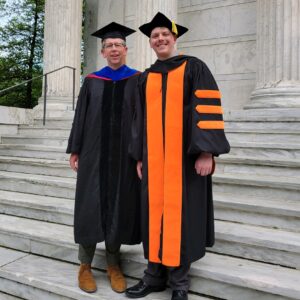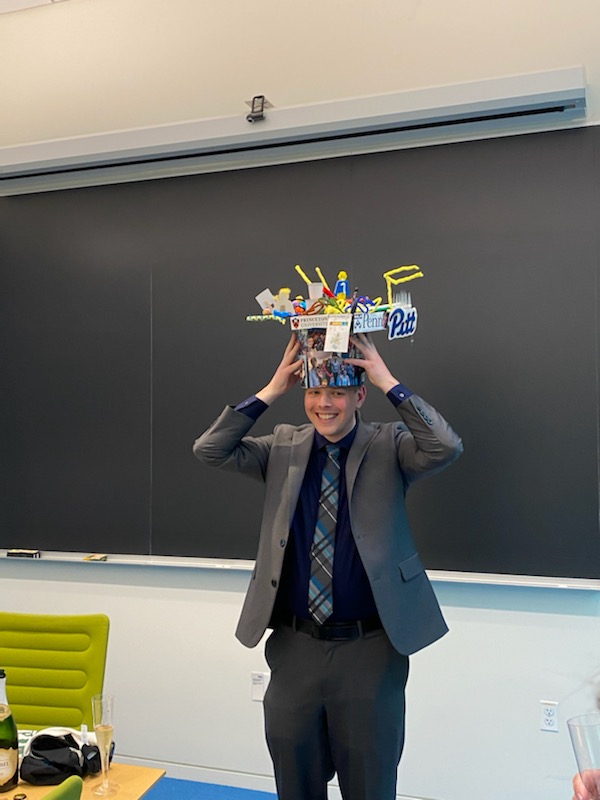Grad Student Q&A: Brad Lukasak, Ph.D.
One of the things that benefitted Brad Lukasak most as a chemist was the early training he got in chemistry labs, both at high school in Pennsylvania and as an undergraduate at the University of Pittsburgh. It gave him an ease with fundamental lab work — synthesizing a small compound, exploring the scientific method — that carried all the way through to May of 2022 when he successfully defended his dissertation as part of the Muir Lab. From his new perch in Cherry Hill, New Jersey and a postdoc at the University of Pennsylvania, Lukasak looks back on his experience at Princeton Chemistry.
What does it feel like to move on from Princeton Chemistry?
Leaving Princeton is bittersweet. Over the course of the past six years, it became my home and it’s where I met my best friends and my fiancée. Grad school was hard, don’t get me wrong, but I am going to miss walking into Frick every day. In the Muir Lab, I gained a second family, and I am going to miss hanging out with them in lab. All that said, I am excited for the future and can’t wait to get started at Penn.

Brad Lukasak, Ph.D., with his advisor Tom Muir, the Van Zandt Williams Jr. Class of 1965 Professor of Chemistry, at the hooding ceremony in May.
What was the hardest part of your doctoral defense?
I think the hardest part was writing a thesis, because I’m trying to write a document about things that, by this point, happened six years ago. And it takes a long time to write that document out. You have to be very thoughtful about how you put it together. I started in January and it took me until nearly the end of March to have a finished document to send to my committee. There are many moments where you’re saying, I don’t know how I’m going to actually finish this and get to the defense date. But you just kind of do.
Any tips on how to prepare for the writing?
I think the biggest thing is just record keeping. I made a point as I was going along of always having a very good record of what I was doing in lab. That made it easier. I think if I hadn’t had that, it would have taken at least a year to write my dissertation.
Why did you choose Princeton for your Ph.D.?
I had a pretty extensive list of graduate schools and I shared it with my advisor at Pitt. And he kinda said, where’s Princeton? At that point, Princeton Chemistry didn’t have a whole lot of chemical biology going on. But my advisor said, what about Tom Muir at Princeton – he’s one of the best in this field. I looked into it and looked at Tom’s lab and was really excited at the prospects, and applied to work with Tom.
How should a “prospective” winnow the list?
Apply to places where there are at least two or three people whose science is exciting to you. If for whatever reason it doesn’t work out in a particular lab, you want to be able to move to another easily.
Can you briefly describe your research?
My focus was on post-translational modification of the histone proteins that make up chromatin. So, I spent almost my whole six years studying this really cool and new modification, serotonylation, where the neurotransmitter serotonin covalently modifies chromatin. When I first heard about it, I thought it was the coolest thing in the world. I spent the last four years characterizing this enzyme and figuring out: what is it about chromatin that is regulating this enzyme?
Looking back, what is the best way to maximize your time with a P.I.?
I was really lucky with Tom. He was always around the lab, so if I needed anything I could just talk to him. I think early on, as a younger student, I was definitely a little bit intimidated by him so maybe I held back from going to him when I shouldn’t have held back. I think the biggest thing to say is, don’t be scared. But if you’re trying to figure out how often you can see them, just ask the other students. Ask the postdocs. More often than not, they’re going to be very open with you about what it’s like to be in the lab. They’re your best resource.

Lukasak after his successful dissertation defense, celebrating with members of the Muir Lab.
Aside from the research, what did you enjoy most?
The grad students and postdocs form their own little community and that was, in my experience, the best part of grad school. It’s 100% the community of the lab. And Tom manages to assemble an incredible team. I don’t know how he has this sort of sixth sense about which people are going to fit in the group, but he does. We have people who are experts on synthesis, on cell work, on peptide chemistry – and you learn from all of them at once. It’s a great way to grow and build as a scientist.
What were the biggest challenges?
I think the biggest challenge – and I still struggle with this today – is recognizing that what we’re doing is really, really hard. You really have to be able to accept that. This is what I said to the lab after my defense: appreciate that things are not going to get easier. It’s going to seem easier because we’re becoming better scientists. But the science is always going to be hard.
Did you feel yourself growing into the job?
I look back at my first year and think of some of the mistakes that I made and it baffles me that I got to where I am now. Now, I am confident about every single thing that I do in the lab. Not that I didn’t make mistakes. But later on, I didn’t let that deter me.
Are you staying in academia?
I am starting a postdoc in July at Penn in the lab of Erica Korb, who runs a neuro-epigenetics lab. So I’m going to be thinking about a lot of the same things I do now, but in a much more biological context. One of the projects I’m hoping to work on is elucidating the molecular mechanism of different neurological disorders, like PTSD, using mice. Whether this leads me to staying in academia in the long-term is still to be determined, and that’s part of the reason that I’m doing a postdoc. I like the fact that my future is still open to whatever I decide, because I still think there’s a lot to find out.
Any advice for current grad students?
I’m just gonna say, be curious. Part of what made me successful in grad school is that I was always curious about what I was doing. That drove me to always ask questions, and I uncovered more questions along the way that I’m a little sad I won’t get to answer myself. But if you’re curious about everything you’re doing, then you’ll have joy in discovering new things.
